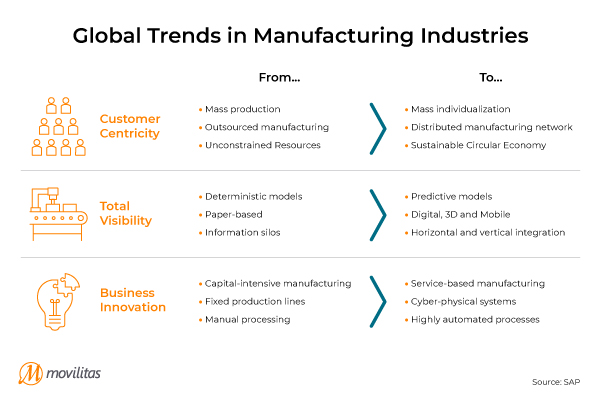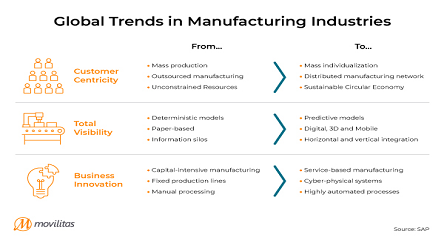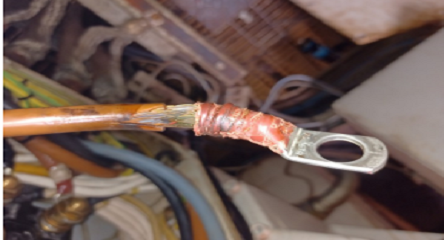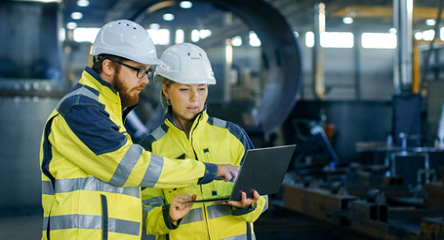Supply and value chains have undergone a dramatic shift since early 2020. While some changes were already in progress, many adjustments were required to adapt to the disruptions. Companies leveraged many tools, including technology, to stay agile, competitive and resilient. An SAP white paper notes that today’s supply chains have become part of a company’s differentiation strategy or competitive advantage.
By becoming resilient, your supply chain can quickly respond and recover from unexpected events. The complex, interconnected challenges of today’s world are constant. How will supply chains continue to transform to meet these challenges as well as future demands?
This blog will look at two 2022 technology trends that we are seeing in key areas of the digital supply chain.
How Sustainability Builds Resiliency
Taking steps to implement sustainable business practices and processes influences decisions across many industries. The demand is growing for responsibly sourced products and services that reduce environmental impacts and social inequities. This requires a full-lifecycle approach. Therefore, companies want to manage performance holistically and profitably through an integrated approach internally and with their supply chain stakeholders. Below are some insights into this trend:
- $90 trillion is projected to be invested in climate-smart infrastructure by 2030 says the United Nations
- 6x faster growth of sustainable consumer packaged goods notes the World Bank Carbon Pricing Dashboard
- 60+ carbon pricing initiatives in effect or scheduled for implementation per a New York University Leonard N. Stern School of Business report
- 11% more new product launches where compliance and sustainability checks are embedded in the development cycle according to an SAP Performance Benchmarks study
Processes guided by a sound strategy and actionable insights create a layer of resiliency and sustainability because continuous improvement and knowledge acquisition is built into everyday actions. You can leverage technology to disrupt and transform how business is done by supporting critical decisions that:
- Accelerate new opportunities for your business
- Create brand value and goodwill
- Drive intelligent operational excellence
- Safeguard people and products by being compliant
Intelligent enterprises integrate business and operational data for real-time insights. This information powers scalable sustainability and other strategies internally and across their value chains through continuous assessments, evaluations and optimizations. This embedded sustainability helps companies and supply chains better adapt to resource availability, regulation changes and changing consumer demands.
Cloud-First Ecosystems
Supply chains have not been linear for many decades. Companies continue to adapt to the changes by updating their processes and systems while implementing new software and tools. The world has reached a critical tipping point for digitization. It almost seems if there isn’t an app or online access, people won’t use it.
As a result, legacy industries, such as manufacturing and logistics, are now migrating towards a connected digital ecosystem to enable greater efficiencies and agility. They understand “inflexible solutions are capable of slowing down the digital transformation of a business.” (ERP News) The next step in this digital transformation is a cloud-first foundation.
There is a growing shift from on-premise installations to subscription models. Cloud technology removes many of the barriers for businesses that were unable to support the budget and staffing required for enterprise-level systems. Without an upfront purchase, the investment moves from capital expenditure to operational cost on the balance sheet. These robust systems are easy to manage and scale while being reliable for mission-critical performance.
Looking at the manufacturing part of the supply chain, companies are accelerating their implementation of cloud-based smart manufacturing execution systems (MES) for taking advantage of trends, such as those noted in the graphic below. These solutions, such as SAP Digital Manufacturing Cloud (SAP DMC), support lean production by creating a central repository of enriched data integrated from machines to business systems (ERPs). This automatically captured information reduces the bottlenecks caused by manual processes, data entry errors and missing information.

Companies control each site yet have the ability to access the holistic, overall view of their entire business. A cloud MES provides a single source of truth in real-time that lets manufacturers manage production from customer order to raw materials to finished goods. This insight from plants to work centers to individual machines helps clients achieve greater flexibility, improve performance, increase traceability and optimize resources. We are seeing how as-a-service solutions are helping redesign business processes and simplify complex practices.
Summary
Sustainability and cloud technology are trending because of the recent focus on addressing climate change and pandemic disruptions. Companies want a profitable full-lifecycle approach that reduces their environmental footprint while supporting diversity and inclusion. This transformation integrates intelligence across the value chain to deliver the optimum customer experience and provide employees with a higher purpose of work.
About Movilitas
Movilitas is a technology leader delivering the next generation of solutions and consulting services across multiple industries to advance smart supply chain ecosystems. We are recognized as a trusted SAP partner for digital supply chain transformation. We help businesses realize new growth opportunities, adapt to today’s on-demand economy and maintain compliance. Through services, such as Movilitas.Cloud, or extensions and accelerators for SAP solutions, our clients unlock data to realize greater efficiencies and new revenue streams. Movilitas applies industry and project experience to help companies from all industries around the globe innovate with smart technologies. The outcome is a digital supply chain transformation that powers the connected economy for a safer and smarter future.






